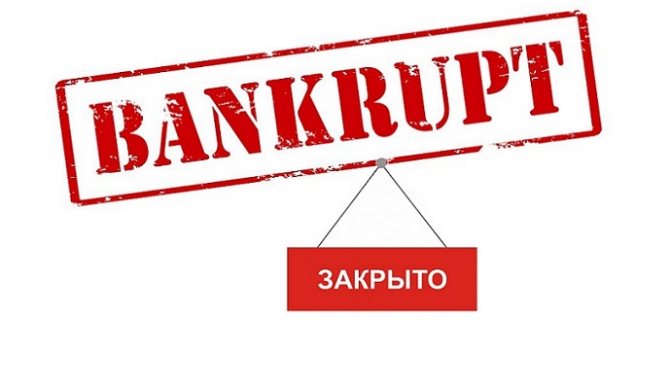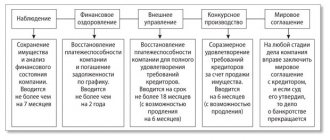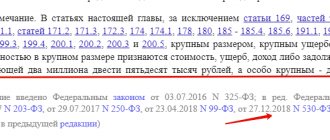A measure such as termination of bankruptcy proceedings is an effective way to support the debtor. As a result of such a decision, the owner is restored to his rights regarding his property. At the same time, he not only retains everything that he could lose if declared bankrupt, but also gets a chance to restore his reputation.
The process of terminating bankruptcy occurs in the prescribed manner and is regulated by Article 57 of the Federal Law “On Insolvency (Bankruptcy)”.
Causes
The debtor has the right to restore the right to manage assets in the following cases:
- if he fully repays debts to creditors;
- in case of concluding a settlement agreement with the creditor.
Reasons
Legislative norms establish a list of grounds for termination of a bankruptcy case by an arbitration court.
- Thanks to effective external management or rehabilitation of the company, it was possible to restore the debtor's solvency.
- The parties to the trial decided to settle the matter peacefully by concluding an agreement.
- During the bankruptcy process, the defendant managed to pay off his debts.
- For some reason, creditors withdrew their applications.
- The applicant does not see the need to further submit claims.
It also happens in judicial practice that the proceedings are closed due to lack of funding. This means that the debtor has practically no funds, and cannot even pay for the services of an arbitration manager.
Procedure
The issue of termination of proceedings in the case is considered by the arbitration court at the place of residence of the defendant. After the interested party submits a petition, he reviews the documents presented and makes a decision as to whether it is advisable to declare the debtor bankrupt.
The most common way to resolve the situation is a settlement agreement. It can be concluded even at the stage of enforcement proceedings. It happens that indirect options are used to stop the case, for example, buying out the claims of creditors.
The court may also decide to restructure the debt. This allows the defendant to obtain a sufficiently long installment plan and fulfill his obligations. Even if restructuring does not help to repay the debts, the stage of selling the property begins.
However, the end of the proceedings does not mean that the entire debt has been repaid. Requirements for alimony payments, current payments to creditors, and compensation for damage caused to health must be satisfied without fail.
In the event that the debtor does not have the money to pay legal costs, an arbitration manager can initiate termination of bankruptcy proceedings for an individual or organization. If a creditor has filed an application to declare the debtor bankrupt, he must pay the court costs.
Consequences
The consequences of termination of bankruptcy proceedings are established by Article 56 of the Federal Law “On Insolvency”. After the decision is made, the debtor is given back the right to dispose of property, as well as the right to freedom of movement (for example, if a ban on leaving Russia was imposed).
As for enforcement proceedings, the creditor has the right to take the enforcement document to the bailiff. But it must be remembered that only current payments or obligations that are not expressed in monetary terms are subject to collection.
Thus, the termination of insolvency proceedings gives the debtor the opportunity to strengthen his position, pay off his debts and avoid financial ruin. In addition, sometimes this step becomes a tool to combat the illegal actions of the debtor, if we are talking about deliberate or fictitious bankruptcy, but such actions are already considered an administrative offense, and in some cases can bring the culprit to the dock.
Dear readers ! If you need expert advice on credit, debt and bankruptcy issues, we recommend that you immediately contact our qualified practicing lawyers:
Dear readers ! If you need expert advice on credit, debt and bankruptcy issues, we recommend that you immediately contact our qualified practicing lawyers:
Termination of bankruptcy proceedings for an individual
Bankruptcy proceedings in relation to individuals can be terminated by an arbitration court for a number of reasons established by law. The court issues a ruling to terminate the proceedings. The most common reasons for stopping this procedure are:
- conclusion of a settlement agreement between the parties;
- lack of financial resources to carry out bankruptcy proceedings;
- failure to appoint a financial manager after three months from the start of the procedure.
All cases of termination of bankruptcy proceedings are specified in Art. 57 of the Federal Law “On Insolvency (Bankruptcy)” dated October 26, 2002 N 127-FZ (as amended and additionally entered into force on January 28, 2018)

Lack of money to finance the procedure
Lack of financial resources to conduct legal proceedings is the most common case in which bankruptcy proceedings are terminated. Funding is required to carry out activities required by law. Funds are needed to organize bidding, pay for publications on the case, remunerate the financial manager, pay for the services of appraisers and other additional actions that are necessary to carry out this procedure. Without financial resources, it is impossible to carry out bankruptcy, and their absence leads to the termination of the procedure.
This is interesting: How long to cook honey mushrooms
The financial manager submits a petition to the arbitration court to terminate the procedure on the grounds of lack of funding. The court makes an appropriate ruling, and the case is considered terminated.
Failure to appoint a financial manager in the case within three months
At the first court hearing in a bankruptcy case, a financial (arbitration) manager must be appointed. This condition is not always met for a number of reasons. A debtor who has applied for the appointment of a manager to an SRO (self-regulatory organization) of arbitration managers may be refused and not given consent to participate in the bankruptcy process. Further appeals to the same or another SRO may also not yield positive results. Without a preliminary agreement with a specific person recommended for the position of manager, it makes no sense to randomly apply for an organization to participate in the trial. First you need to secure the consent of the potential financial manager. Otherwise, your time will be wasted.
The reason for termination of bankruptcy proceedings for an individual may be the failure to appoint a financial manager after three months from the date of the first court hearing in this case. The basis for termination is clause 9 of Article 45 of the Federal Law “On Insolvency (Bankruptcy)”.
Consequences of termination of the procedure
Termination of bankruptcy proceedings does not mean that the debtor is refused to declare himself bankrupt. This means that the procedure has been terminated, which does not make it impossible to re-apply once the obstacles have been removed.
All restrictions that were in force by law during the proceedings are removed from the debtor in accordance with Article 56 of the Federal Law “On Insolvency (Bankruptcy)”. It is important to know that the individual will be refunded the state duty and funds deposited with the arbitration court to finance the procedure.
In the future, the creditor or debtor may file a new application to declare the citizen bankrupt. Termination of bankruptcy proceedings does not limit the right of the debtor and creditor to take actions aimed at protecting their interests.
Comments on Article 57
- This article establishes a list of grounds for termination of bankruptcy proceedings for a citizen and a legal entity. The problem is that the provisions of the article are related and at the same time run counter to the administrative procedural code of the Russian Federation. Namely, with Article 150, which specifies other reasons for termination of the case. Therefore, the provisions of the commented Federal Law should be considered a priority when it comes to the insolvency process of an individual or legal entity.
- This article defines the following list of reasons according to which bankruptcy proceedings should be terminated:
- The potential bankrupt has the opportunity to pay bills at the stage of financial recovery.
- Conclusion of a settlement agreement between the debtor and bankruptcy creditors. One of the necessary conditions of such a document is the debtor’s obligation to partially repay the debts in the near future.

The law provides for a number of circumstances under which a debtor can count on the closure of a bankruptcy case
- If, in the course of consideration of the case, it turned out that the creditor’s claims were excessive and were not enough to initiate an insolvency procedure. This condition is valid only if the debtor has no other obligations that could cause him to become bankrupt.
- If the creditors waive the demands specified in the application submitted to the arbitration court, or they waive the need to declare the debtor insolvent as a last resort. This decision can be made at a plenum of creditors and is due to the fact that in the current situation they risk losing all or most of their investments.
- Repayment of all debts included in the register of creditors at any stage of the insolvency case. Including at the observation stage.
- The potential bankrupt has the opportunity to pay his bills at the stage of external management.
- If the debtor does not have enough funds to pay legal costs and remuneration for the work of the arbitration manager. In fact, judicial practice is such that in the absence of the required amount of assets, the court may not even accept a petition to initiate bankruptcy proceedings. The situation especially concerns individuals. For legal entities, there is a whole list of reasons when the court must begin the bankruptcy process even in the complete absence of funds.
This list is considered open, since at the end of the first paragraph there is a note that other reasons and methods that do not contradict this Federal Law may be used to terminate the case. For example, when a third party appears ready to provide financing for the debtor.
- When the bankruptcy procedure is stopped, the provisions of Article 56 of the Law come into force, determining the consequences of termination of the legal process.
Download article:
Termination of bankruptcy proceedings Article 57
You can learn about bankruptcy of individuals from the video:
Attention! Due to recent changes in legislation, the legal information in this article may be out of date!
Our lawyer can advise you free of charge - write your question in the form below:
Termination of bankruptcy proceedings
- Federal Law No. 127-FZ “On Insolvency (Bankruptcy)” Current version of Law 127-FZ dated 07/03/2016 with amendments that came into force on 01/01/2017
- Chapter III /
Contents /
1. The arbitration court shall terminate bankruptcy proceedings in the event of:
restoration of the debtor's solvency during financial recovery;
restoration of the debtor's solvency during external administration;
concluding a settlement agreement;
recognition during the observation as unfounded the claims of the applicant, which served as the basis for initiating bankruptcy proceedings, in the absence of other creditor claims declared and recognized in the manner established by this Federal Law;
refusal of all creditors participating in the bankruptcy case from the stated claims or demands to declare the debtor bankrupt;
satisfaction of all claims of creditors included in the register of creditors' claims during any procedure applied in a bankruptcy case;
lack of funds sufficient to reimburse legal costs for the procedures applied in the bankruptcy case, including the costs of paying remuneration to the insolvency administrator;
in other cases provided for by this Federal Law.
2. In the cases provided for in paragraph 1 of this article, the consequences of termination of bankruptcy proceedings established by Article 56 of this Federal Law apply, unless otherwise established by this Federal Law.
The provisions of Article 57 of Law No. 127-FZ are used in the following articles:
- Article 63 Consequences of a ruling by an arbitration court to impose supervision 5. In the event of termination of bankruptcy proceedings on the grounds provided for in paragraph seven of paragraph 1 of Article 57 of this Federal Law (including as a result of the debtor paying off all claims of creditors included in the register of creditors’ claims , in the course of monitoring or repayment of such claims during any procedure applied in a bankruptcy case, by a third party in the manner established by Article 113 or 125 of this Federal Law), the creditor has the right to present to the debtor a demand for collection of the remaining interest in the amount established by the Central Bank of the Russian Federation on the date of introduction of observation, the refinancing rates that were accrued for the period of the procedures applied in the bankruptcy case, according to the rules of this Federal Law, in the manner established by procedural legislation. Open article
- Article 147 Report of the bankruptcy trustee on the results of the bankruptcy proceedings 1. After completing settlements with creditors, as well as upon termination of bankruptcy proceedings in the cases provided for in Article 57 of this Federal Law, the bankruptcy trustee is obliged to submit to the arbitration court a report on the results of the bankruptcy proceedings . Open article
- Article 148 Property of the debtor not sold during bankruptcy proceedings or remaining after completion of settlements with creditors 16. If there is remaining property, the value of which is not less than the minimum amount of the authorized capital provided for by the legislation of the Russian Federation for legal entities of the corresponding organizational and legal form, the management body the debtor, authorized to make a decision on its liquidation, has the right to decide to apply to the arbitration court considering the bankruptcy case with a petition to terminate bankruptcy proceedings in accordance with paragraph seven of paragraph 1 of Article 57 of this Federal Law. Open article
This is interesting: The resolution was sent to the FSSP of Russia
© 2009 — 2020 ICC “Systems and Technologies”
Postponement of bankruptcy (insolvency) – petition, consequences
Theoretically, the course of a bankruptcy case can be interrupted at the request of any person who is a participant. But almost everything is not so simple.
Suspension of a bankruptcy case is possible only if there are compelling reasons for the arbitration court.
Suspension of a bankruptcy case is an interruption of the consideration period at the request of any person participating in it, if its purpose is to appeal decisions of the arbitration court, creditor meetings and other procedural documents (Article 58, Federal Law “On Insolvency”).
The suspension of a bankruptcy case to a certain extent limits the actions of the arbitration court, which does not have the right to adopt acts provided for in Art. 52 Federal Law “On the insolvency of the debtor” .
But it cannot be said that a stay completely freezes the entire trial.
For example , it is not an obstacle to making other determinations provided for by law and taking actions that do not relate to issues of appeal.
Legislation
Answers to questions about how bankruptcy proceedings are suspended can be found in the following regulations:
- The Arbitration Procedure Code of the Russian Federation; The Arbitration Procedure Code of the Russian Federation regulates the suspension procedure itself. It is in this normative act that one can find information about when a judge is obliged to suspend the process, and when this is his right.
- The Tax Code of the Russian Federation; The Tax Code of the Russian Federation gives an interpretation of the suspension of bankruptcy from its point of view.
- Federal Law “On Debtor Insolvency”; The Federal Law “On Bankruptcy” gives an interpretation of the essence of the concept of “suspension” and establishes the circle of persons who can be the initiators of the interruption of the case.
For example , if the debtor's insolvency has developed due to non-payment of mandatory payments and taxes, the supervisory authority, based on an appropriate application, has the right to suspend the bankruptcy case.
Who is the initiator: filing a petition
Any participant in the case can file a petition to suspend the bankruptcy procedure.
The initiator of the interruption of the process can be the debtor, creditor, interested party, authorized state bodies (tax and labor inspectorate, Social Insurance Fund, Pension Fund of the Russian Federation), arbitration manager and even the judge himself ( Article 58, Federal Law “On Insolvency” ).
In which cases
You can apply to the court to suspend the consideration of the case in the following cases:
It is important to challenge the following procedural documents:
- decision to declare the debtor bankrupt;
- decision to refuse to recognize the debtor's insolvency;
- determination on the introduction of a reorganization procedure;
- determination on the introduction of external management;
- determination to terminate bankruptcy proceedings;
- a ruling to leave the application to recognize the debtor as economically insolvent without consideration;
- ruling on approval of the settlement agreement ( Article 58, Federal Law “On Insolvency” ).
The arbitration judge is personally obliged to stop the process if:
- the case cannot be considered until another case is resolved, which is under the jurisdiction of any other court on the territory of the Russian Federation;
- individuals who are defendants or plaintiffs in the case are in the service of the RF Armed Forces;
- a citizen who was a party to the case or a third party died, provided that the relationship allows for legal inheritance;
- the person who was a party to the case has lost his legal capacity ( Article 143, Arbitration Procedure Code of the Russian Federation ).
It is at the personal discretion of the court to suspend a bankruptcy case in the following cases:
- when ordering an examination;
- reorganization of a business entity that is a party to the case;
- to attract a citizen who must perform government duties during the process;
- when a person interested in the case is on a long business trip;
- when a party to the case or an interested person is on sick leave or on a business trip;
- when a foreign court considers a case that is related to the bankruptcy process ( Article 144, Arbitration Procedure Code of the Russian Federation ).
Obviously, you can apply to the court to suspend a bankruptcy case in cases provided for in Art. 58 Federal Law “On Insolvency”, and Art. 143-144 Arbitration Procedure Code of the Russian Federation.
Office Options
Bankruptcy proceedings can be interrupted at any stage. inclines us to this conclusion . 52 Federal Law “On Bankruptcy” . It lists procedural documents that can be appealed by any participant in insolvency proceedings.
It is the appeal of these documents that is one of the grounds for filing a petition to suspend the trial.
For example , a creditor may petition to suspend the bankruptcy procedure if he intends to appeal the decision of the arbitration court to refuse to recognize the debtor’s financial insolvency.
It is obvious that the bankruptcy procedure, in fact, has not begun, and suspension is already possible.
Another example would be the debtor’s request to suspend the bankruptcy case in connection with challenging the decision of the creditors’ meeting.
the insolvency process has not yet begun
In order to understand how the suspension of insolvency proceedings is carried out, you need to know what is included in the concept of “bankruptcy procedure”.
The bankruptcy procedure is all the actions that are carried out by the arbitration court after a ruling is made recognizing the material worthlessness of the debtor.
Thus , all actions that will be carried out by the parties and the court before this determination is made will be considered carried out outside the bankruptcy procedure. Before the commencement of the process, any party may file a motion to stay the process.
Based on consideration of the petition, the court makes one of two determinations:
- on suspension of bankruptcy proceedings;
- to refuse the request.
If the court suspends the process on its own initiative, then it simply issues an appropriate ruling ( Article 147, Arbitration Procedure Code of the Russian Federation ).
The decision to suspend or refuse it may be appealed.
the procedure has already begun
The procedure for suspending the bankruptcy procedure itself does not differ significantly from the procedure for interrupting the process before it.
Using analogy, the court considers the request of a party or interested person and makes a ruling based on it. This may concern the suspension of insolvency proceedings or the refusal of an application. But the peculiarity is that if the procedure has already been started, the suspension will affect only part of the acts issued by the court.
In other words, the court cannot make determinations specified
in Art. 52 of the Federal Law “On Insolvency ,” but this does not limit his right to make other decisions that will relate to the essence of the case.
Thus, if the bankruptcy procedure has already begun and the debtor has been declared bankrupt, then during the suspension the court cannot initiate the start of a reorganization procedure or external management ( Article 58, Federal Law “On Bankruptcy” ).
Arbitrage practice
If we compare the number of granted applications for suspension of insolvency proceedings with those that were rejected in 2015 , then an obvious advantage will be on the side of refusals.
An example of a court decision can be downloaded here.
There are several reasons for this:
- insufficient motivation;
- lack of motivation in the application;
- wrong motivation.
Insufficient motivation is expressed in the fact that the parties and interested parties in petitions are limited to simple references to the provisions of the law. For example , indicate Art. 143 of the Arbitration Procedure Code of the Russian Federation , which gives the court the right to suspend the bankruptcy procedure, but does not explain the connection with the case being considered by a foreign court.
The lack of motivation is most often due to the fact that the parties and interested parties describe the current situation in the petition without indicating the rule of law that could be applied in their case.
The wrong reasoning is that the applicants have the right to have the insolvency proceedings suspended, but they base their claims on rules that do not apply to their personal case.
More information about the bankruptcy procedure can be found here.
Details about the bankruptcy of an absent debtor are written here.
Suspension of a bankruptcy case limits the court's actions.
If the suspension occurred during one of the insolvency procedures, this means that until the case is resumed it will not be possible to proceed to the next stage.
But, within the framework of the suspended procedure, the court has the right to issue rulings, as well as the arbitration manager to perform his duties.
Question: For how long can the court suspend the progress of a debtor’s insolvency case?
Question: How much does interruption of the process affect the duration of the entire bankruptcy procedure?
Answer: Most cases are suspended until a decision is made on the disputed document. These deadlines cannot significantly affect the duration of the procedure for recognizing the debtor's insolvency.
In Art. 52 of the Federal Law “On Insolvency”, among the entire list there are no documents that would limit the capabilities of the court or bankruptcy trustee during bankruptcy proceedings.
But in practice, the courts always suspend payments to creditors until the trial is resumed.
According to Art. 64 of the Tax Code of the Russian Federation , a deferment in tax payment may be granted to an organization that is facing the threat of insolvency due to non-payment of taxes.
In addition, one of the following circumstances must exist:
The costs of staying bankruptcy proceedings shall be borne by the person or party filing the petition. This may be a creditor, debtor or other interested party.
Source: https://prosud24.ru/otsrochka-bankrotstva/
Crisis management
Bankruptcy legislation indicates as permissible the following possible anti-crisis measures that can be presented in terms of external management, including re-profiling of production, closure of unprofitable production, collection of receivables, sale of part of the debtor’s property, increase in authorized capital, replacement of assets, as well as other possible measures.
Not only is this list incomplete, but it also often does not allow us to cope with the crisis state of the enterprise.
Indeed, the measures proposed by bankruptcy legislation concern, first of all, transactions with assets and only slightly affect anti-crisis measures with the capital of the organization.
examines the activities of the enterprise as a whole, highlighting among the measures included in the anti-crisis package:
- Operations with assets, which consist of increasing the liquidity of existing assets and increasing the efficiency of their use
- Operations with liabilities – restructuring of accounts payable or raising borrowed funds
- Anti-crisis management measures, including in personnel, sales, purchasing policies, development and implementation of a system for managing receivables and payables
- Capital transactions involving recapitalization or increasing the capitalization of an enterprise, increasing its investment attractiveness
In each given situation, it is possible to implement a different package of anti-crisis measures, which may include both operations with assets, with enterprise management, and with liabilities - capital and liabilities.
The concept of "bankruptcy"
The term synonymous with bankruptcy is insolvency. It characterizes a situation that can arise for both an individual and a legal entity when it is unable to repay debts to the state for mandatory payments or to borrowers. This situation occurs after it is recognized in the prescribed manner by the relevant state bodies.
Bankruptcy also refers to the process of assessing the financial condition of an entity that has debts. If the procedure is initiated by the debtor himself, then it is called self-bankruptcy. Many citizens are interested in the question: can bankruptcy proceedings be terminated? The answer to this can be found later in the article. But first you need to get some background information.
Termination of bankruptcy case
One of the anti-crisis management measures may be the termination of bankruptcy proceedings.
The termination of bankruptcy proceedings is necessary for the owners of a business that, against their will, entered into bankruptcy proceedings (for example, at the request of the tax service), or the situation has changed and it is necessary to “pull” the company out of bankruptcy.
What does dismissal of a bankruptcy case mean?
Termination of bankruptcy proceedings is a general term meaning the termination of bankruptcy proceedings, since bankruptcy is a court matter.
Consequences of termination of a bankruptcy case: restoration of the rights of owners (title of ownership of shares).
In other words, the founder returns to himself the enterprise, which in the event of bankruptcy proceedings he will simply lose.
How to terminate a bankruptcy case?
The general grounds for termination of a bankruptcy case are established by Article 57 of the Bankruptcy Law and include the following:
- restoration of the debtor's solvency during financial recovery
- restoration of the debtor's solvency during external administration
- conclusion of a settlement agreement
- recognition of the applicant's claims as unfounded during surveillance in the absence of other creditors
- refusal of all creditors participating in the bankruptcy case from the stated claims or the requirement to declare the debtor bankrupt
- satisfaction of the claims of creditors included in the register of creditors' claims during any of the bankruptcy procedures
- lack of funds sufficient to reimburse legal expenses for bankruptcy proceedings
The most commonly used are the conclusion of a settlement agreement, which allows the payment of the debt to be spread over a long period of time, as well as the repayment of creditors’ claims.
In addition, indirect methods of ending a bankruptcy case are often used, for example, as a result of “buying out” claims for tax payments.
One way or another, building a strategy for ending a bankruptcy case is based on actual circumstances, taking into account available capabilities and resources.
Service provision procedure
Termination of bankruptcy proceedings is legal, which consists in
- advising on choosing the most optimal strategy for terminating bankruptcy proceedings
- assistance in creating conditions for termination of bankruptcy proceedings
- legal support for termination of bankruptcy proceedings at all stages
Termination procedure
The consideration of the insolvency case itself falls within the competence of the arbitration court and is carried out at the place of residence of the defendant (or in accordance with the legal address of the organization). To avoid bankruptcy, the following measures are usually taken:
- conclusion of a settlement agreement between the parties;
- sale of property at auction to pay off debt;
- debt restructuring.
Sometimes the process is suspended when a corresponding request is submitted by persons interested in the case. Then the judge is given time to study the materials, after which he has the right to decide whether the request for recognition as untenable is justified and legal. Next, a moratorium is imposed on the fulfillment of any financial obligations. Most often, the courts prefer to use restructuring, but even if this does not help the debtor cope with the problems, then the following happens:
- a decision is made on the bankruptcy of a citizen or company;
- certain restrictions are imposed regarding travel to other countries;
- the property is sold at public auction.
Free legal consultation
We will answer your question in 5 minutes!
Call
Usually the process takes about six months, and sometimes longer.
Free legal consultation
We will answer your question in 5 minutes!
Application Form
When the insolvency practitioner is responsible for drawing up the request, he bases the request on:
- reporting documentation;
- other evidence confirming the impossibility of further carrying out the procedure.
You should once again pay attention to the already mentioned article 57 of the relevant Federal Law No. 127. It lists all the grounds upon which the arbitration court terminates the insolvency proceedings.
If we talk about evidence, then they use:
- reports prepared by external managers;
- registration information about the organization
- a document confirming the possibility and right to go to court;
- minutes of the meeting of creditors and a register of their claims.
Sample
applications can be made by
Recommendations for drawing up an application
If a person requests termination of insolvency proceedings, his request must include the following information:
- the exact name of the court where the specified application is sent;
- information about the parties to the case and interested persons, if relevant;
- the basis for writing the application;
- case number for identification;
- a detailed description of all relevant circumstances and legal facts;
- list of applicant's requirements;
- an indication of the legal norms that guided the originator of the petition and which confirm his requirements;
- date and signature of the person making the request;
- a list of attached documents to confirm all the mentioned facts.
Drawing up a settlement agreement
This measure is considered an anti-crisis measure for companies and individuals in the process of filing for bankruptcy.
Usually, drafting a settlement agreement does not cause difficulties, but it also has features and nuances that a person without the appropriate experience and education may not be aware of. For this reason, it is better to entrust the task of writing this document to specialists.
Next, the settlement agreement is subject to approval by the judicial authority conducting the proceedings.
Sample
a settlement agreement is possible
Drawing up a draft settlement agreement in a bankruptcy case
Also, drawing up a draft settlement agreement can be one of the anti-crisis management measures.
Settlement agreement in a bankruptcy case
- This is a bankruptcy procedure, as a result of which the bankruptcy case is terminated.
The service consists of preparing a draft settlement agreement, taking into account the nuances of a bankruptcy case, bankruptcy legislation and arbitration practice.
has significant experience in drawing up settlement agreements in bankruptcy cases and is ready to help you realize the benefits of this bankruptcy rehabilitation procedure.
Main
– a professionally drawn up settlement agreement allows you to ensure the approval of the settlement agreement in court and thereby bring the company out of bankruptcy.
Why is a settlement agreement needed?
A professionally drafted settlement agreement allows the OWNERS OF THE ORGANIZATION
bring the company out of bankruptcy and preserve its assets. which are recorded on the organization’s balance sheet. In addition, a settlement agreement can be made an even better deal by providing
ENTERPRISE MANAGER
. often, no less than the founder is interested in bringing the enterprise out of bankruptcy. By concluding a settlement agreement in the monitoring procedure, the manager retains his position and saves the enterprise.
For CREDITORS
a settlement agreement is a transaction determining whether the debt recorded in the register of creditors' claims will be repaid. Our experience in drawing up settlement agreements will help you establish proper control over the implementation of the settlement agreement, provide the necessary guarantees, and also develop favorable conditions for you.
Agreement between the parties
A way out for the debtor may be to offer the creditor to enter into a settlement agreement. The bilateral agreement specifies the procedure for repaying debts and resolving disputes. The document signed by both parties is submitted to the court for review and approval. The settlement agreement serves as the basis for termination of proceedings to declare the debtor bankrupt.
If there are several creditors, the settlement agreement is concluded by the procedure of the general meeting of the parties. If the debtor, after a certain time, does not take measures to comply with the terms of the agreement, or grossly violates them, the court may, in a simplified manner, redirect the foreclosure on the debtor’s property or initiate a repeat bankruptcy procedure.
Only a court can revoke a written agreement between the parties.
External management plan
If a company has reached bankruptcy proceedings, it means that not everything was going smoothly in its activities and that it was being managed ineffectively. Accordingly, she will not be able to get out of the debt hole on her own. Can bankruptcy proceedings be terminated if the company does not have a competent manager who is able to make payments on debts? Hardly. Therefore, external control is introduced. It is mandatory in case of business insolvency.
Within a month from the date of appointment, the new manager must develop an external management plan. It is approved by the meeting of creditors. This document must contain a list of measures aimed at restoring the debtor’s solvency. Also, this kind of plan should include information about the timing and order of procedures, the amount and content of expenses.
Petition
With the help of a petition, you can ask for termination of bankruptcy proceedings. This document can be sent to the arbitration court by any interested party. If this is an arbitration manager, then it should contain references to:
- report;
- justified and documented reasons for termination of office work.
Creditors can also request closure of the case based on the results of consideration of the arbitration manager’s report if they find sufficient arguments in it. This document, as well as the register of creditors, minutes of the meeting of creditors and other documentary information may be attached to the application by the person applying to the court.









